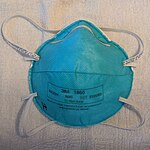An N95 respirator is a disposable filtering facepiece respirator or reusable elastomeric respirator filter that meets the U.S. National Institute for Occupational Safety and Health (NIOSH) N95 standard of air filtration, filtering at least 95% of airborne particles that have a mass median aerodynamic diameter of 0.3 micrometers under 42 CFR 84, effective July 10, 1995. A surgical N95 is also rated against fluids, and is regulated by the US Food and Drug Administration under 21 CFR 878.4040, in addition to NIOSH 42 CFR 84. 42 CFR 84, the federal standard which the N95 is part of, was created to address shortcomings in the prior United States Bureau of Mines respirator testing standards, as well as tuberculosis outbreaks, caused by the HIV/AIDS epidemic in the United States. Since then, N95 respirator has continued to be solidified as a source control measure in various pandemics that have been experienced in the United States and Canada, including the 2009 swine flu and the COVID-19 pandemic.
The N95 respirator is commonly made of a fine mesh of synthetic polymer fibers, specifically a nonwoven polypropylene fabric.[2] It is produced by melt blowing and forms the inner filtration layer that filters out hazardous particles.[3] However, the N95 standard does not preclude alternative means of filtration, so long as the respirator meets N95 standards and is approved by NIOSH.
The N95 is a trademark of the United States Department of Health and Human Services. It is illegal in the United States to use the term "N95" without the approval of NIOSH.
- ^ "Counterfeit Respirators / Misrepresentation of NIOSH Approval". May 23, 2024.
- ^ Cite error: The named reference
VOADeliverwas invoked but never defined (see the help page). - ^ Feng, Emily (March 16, 2020). "COVID-19 Has Caused A Shortage Of Face Masks. But They're Surprisingly Hard To Make". Goats and Soda. NPR.


